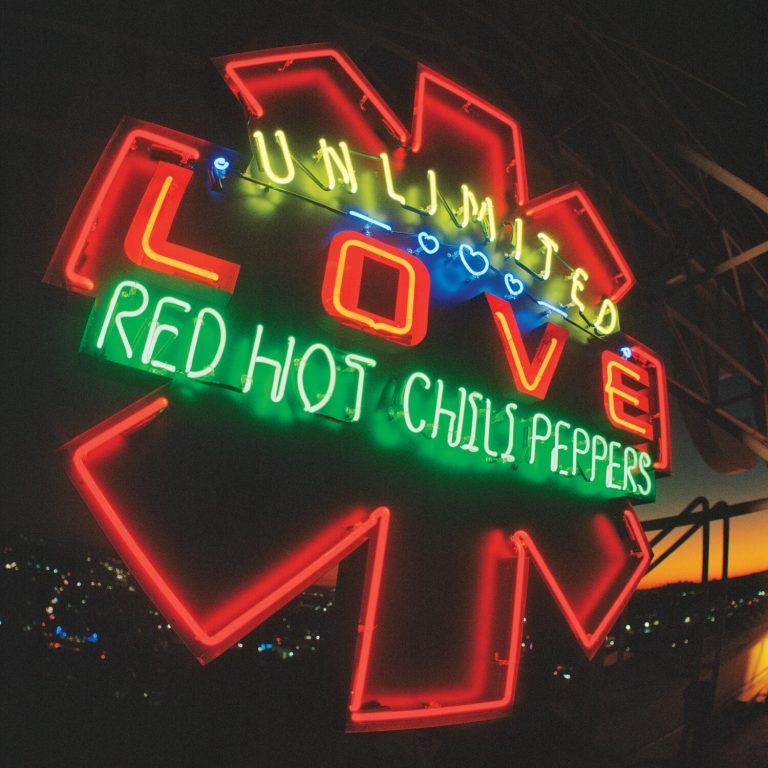If, in 1985, one were laying out the odds for bands with the potential to be the biggest in the world, Red Hot Chili Peppers would have felt, at best, like extremely unlikely candidates. To be sure, they had a scrappy energy that endeared them to their fanbase, and plenty of toxic rock star energy that simply would not fly in today’s world (just look up what inspired “Catholic School Girls Rule” – vile), but biggest band on the planet? The idea would have seemed absurd. Their music, however boisterous, was still largely amateurish and their attitude lacked any of the grace or insight that would some day produce the likes of “Under the Bridge”.
This all began to change with the arrival of John Frusciante. The guitarist and songwriter ever so gradually began to wrestle their music towards something that could be considered melodic – sometimes having to fight tooth and nail to do so (see his battles with producer Michael Beinhorn across the making of Mother’s Milk). It’s impossible to ignore the supreme talent of Flea’s bass playing, or whatever exactly has become the appeal of Anthony Kiedis’ goofy babble as lyricism, but there’s simply no denying it: the Red Hot Chili Peppers are what they are thanks to Frusciante.
It’s been proven not once, but twice, first when Frusciante’s destructive addiction led to his absence from the decent-at-best One Hot Minute and again when he left for more creative reasons following the delightfully bloated Stadium Arcadium. While replacement Josh Klinghoffer did his damndest, it just wasn’t the same, resulting in the simply passable I’m With You and the slightly desperate Danger Mouse-helmed gamble that was The Getaway.
So, then, excitement was palpable when it was announced in late 2019 that Frusciante would be rejoining the band. Since then, understandably for an aging act, the Peppers have been patient in delivering their first effort since his return, which has only now finally materialized as Unlimited Love. As the title readily implies, there’s plenty of generosity to be found here, across a considerable tracklist running 73 minutes and limitless riffs.
What’s near entirely absent, however, is the sense of adventure one might have hoped for given the band’s patron saint’s return. For those hoping for a return to the bubbly experimentation of By The Way or the endearing energy of Stadium Arcadium, well, you’d be best served simply returning to those albums.
This isn’t to say the only shot for genuine success here was repeating themselves, if anything, a bold misfire in any new direction would have been preferable to what the band opted to produce: the safest possible route of a band doing what it is they believe they’re supposed to do. For a band that’s been so uproariously uncontainable for so long, it’s truly bizarre to see them arrive on autopilot.
Things start off reliably enough with the weathered lead single “Black Summer”, but the more you slide into the song, the more inescapable it becomes that it simply feels like something that would’ve been cut from Californication. “Aquatic Mouth Dance”, however, Kiedis’ hook be damned, is a highlight, benefiting from Flea’s loping bass, a bombardment of horns, and a generally playful atmosphere that’s absent all too often across Unlimited Love.
“Not the One”, conversely, paints in delicate shades, but falls far short from the band’s best emotive slow jams, chugging half-heartedly towards nowhere in particular. Even Kiedis’ seemingly indefatigable horniness feels like it’s out of steam, displayed across the dull “She’s a Lover”, with the best come on he’s able to come up with proving (sigh), “I just wanna lick your face.” The band feels equally unenthused behind him, coasting dryly.
While there’s certainly some joy to be found in Frusciante returning to guitar following years of primarily electronic tinkering, it feels almost unfathomable that a man that’s been so relentlessly exploratory in his own work (not to mention his past work with the band) to simply fall in line and churn out music that lacks any personality beyond playing to ‘the Chili Peppers sound’. One can only imagine the joy the band must have felt in reuniting – not to mention linking back up with longtime producer and ally Rick Rubin. So, if simply recapturing the sounds of their glory days was their goal, it’s more than understandable, but it’s odd bordering on baffling that none of that joy is detectable within the music itself. It’s far from a miserable affair, it certainly passes the time, it’s just hard to imagine how so much talent in a room didn’t arrive with something that didn’t feel so staid.

